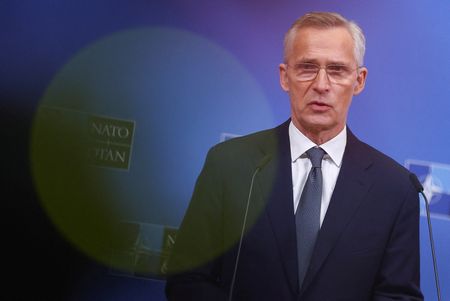By John Irish
PARIS (Reuters) – North Korea and Iran’s military support to Russia has serious global security consequences that the 32-member NATO alliance cannot ignore, Secretary General Jens Stoltenberg said on Wednesday.
Pyongyang has transferred ballistic missiles and other weapons to Russia, while Iran has also provided Moscow with the supply of Shahed drones, frequently used to attack Ukrainian infrastructure.
In return, Russia has provided technology and supplies that help their own missile and nuclear capabilities.
Western powers are increasingly concerned Tehran could soon also transfer ballistic missiles to Russia.
“Russia’s friends in Asia are vital for continuing this war of aggression,” Stoltenberg said as ministers met in Brussels.
China was also “propping up Russia’s war economy,” he said.
“This has regional and global security consequences,” Stoltenberg said, adding that the ministers would discuss how to handle the issue.
In February, Reuters reported that Iran has provided Russia with a large number of powerful surface-to-surface ballistic missiles, citing six sources, in a sign of deepening military ties between the two U.S.-sanctioned countries.
While Washington and other Western officials have repeatedly warned Iran against providing such weaponry to Russia, they have not confirmed that Moscow has taken delivery of the missiles.
Both the G7 and the European Council have said that such a step would lead to major consequences in its relations with Tehran and said third parties who provide weapons could also face further measures.
European diplomats have said potential measures on Iran could include targeting Iran Air, banks in Europe and even the possibility of reimposing UN Security Council sanctions as part of a nuclear agreement between Iran and world powers.
NEW IRAN SANCTIONS?
According to five European diplomats, the foreign ministers of France, Germany, Netherlands, the Baltic States, Czech Republic, Denmark and Romania sent a letter on Feb. 19 to EU foreign policy chief Josep Borrell asking for new EU-wide sanctions on Iran.
The new measures would be two-pronged. Further sanctions would target Iran’s support of Russia, but there would also be new measures focused on Iranian individuals and companies that arm, finance and train proxies in the Middle East as well as possible sanctions on the groups themselves, the diplomats said.
Initial discussions have taken place at EU level, but some of the 27-member states remain opposed.
According to the diplomats, Borrell responded cautiously to the ministers saying there was an existing legal basis for measures against Islamist militant group Hamas.
He also warned that any new sanctions should be carefully considered to ensure they were legally sound, but also avoided harming its activities in the region, notably over Iran’s nuclear programme, for which the EU is a facilitator.
“There is a rather clear triangle with Russia, Iran and North Korea. Both Iran and North Korea supplying weapons and ammunition to Russia, which is then using these weapons and ammunition to try to destroy Ukraine. So that is a very real cooperation, which is a great concern to everyone” Latvia’s Foreign Minister Krisjanis Karins.
(Reporting by John Irish; Editing by Alexandra Hudson)











